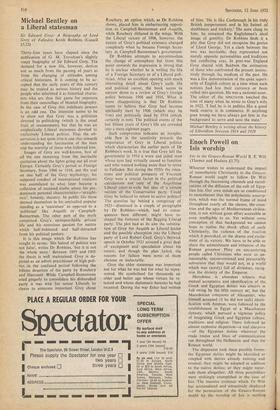Michael Bentley on a Liberal statesman
Thirty-four years have elapsed since the publication of G. M. Trevelyan's slightly soapy biography of Sir Edward Grey. The demand for a new life, however, derives not so much from the passing of years as from the changing of attitudes among critical historians. It is coming to be ac- cepted that the early years of this century may be treated as serious history and the people who inhabited it as historical charac- ters who are thus fair game for exposure from their camouflage of bloated biography. In the case of Grey this indelicate process is an odd one. The intention seems to be to show not that Grey was a politician devoted to politicking (which is the usual fruit of reassessment) but that he was an emphatically Liberal statesman devoted to exclusively Liberal politics. That the ob- servation is not quite trite is one clue towards understanding the fascination of the man and the worship of those who followed him.
Images of Grey are well-known, best of all the one stemming from the inevitable quotation about the lights going out all over Europe. Certainly Grey's period as Foreign Secretary, from 1906 to 1916, put the seal on one half of the Grey mythology; his supposed conduct of international relations was assimilated to what later became a collection of received truths about his pre- dominant personal characteristics—'straight- ness', honesty, decency. In public life these showed themselves in his unrivalled popular standing as a 'statesman' as opposed to a 'politician' like Asquith or Campbell- Bannerman. The other part of the myth concerned Grey's unimpeachable private life and his notorious• passion' for nature which half-bolstered and half-detracted from his political posture.
It is this image which Dr Robbins has sought to revise. 'His hatred of politics was not false', writes Dr Robbins, 'but it is not the whole story.' Between 1895 and 1905 the thesis is well maintained. Grey is de- picted as an adroit practitioner of high poli- tics in the confused period following the bilious desertion of the party by Rosebery
and Harcourt. While Campbell-Bannerman tried gingerly to consolidate his dishevelled party it was wise for senior Liberals to cleave to someone important. Grey chose
Rosebery, an option which, as Dr Robbins shows, placed him in embarrassing opposi- tion to Campbell-Bannerman and Asquith, while Rosebery dithered in the wings. With the Liberal victory of 1906, however, the nature of Grey's political existence changed completely when he became Foreign Secre- tary in Campbell-Bannerman's government. Dr Robbins attempts to accommodate the change of atmosphere but from this point onwards the impression is strong that he is unclear whether he is writing the life of a Foreign Secretary or of a Liberal poli- tician. After an excellent opening with much interesting detail about Grey's early life and political career, the book seems to narrow down to a review of Grey's foreign policy between 1906 and 1916. What is more disappointing is that Dr Robbins seems to believe that Grey had become spiritually inert by 1906 (which may be true) and politically dead by 1916 (which certainly is not). The political events of the last fifteen years of Grey's life are crowded into a mere eighteen pages.
Such compression indicates an inexplic- able flaw in the sensitivity towards the importance of Grey in Liberal politics which characterises the earlier parts of Dr Robbins's work. It is true that Grey left the government in 1916 a worn and jaded man whose eyes had virtually ceased to function and who wanted nothing more than to retire to Falloden. But during the 1920s the inten- tions and political prospects of Viscount Grey were a crucial factor in the political calculations not only of the Asquithian Liberal court-in-exile but also of a certain section of the Conservative party. Could Grey be induced to return to active politics? The question lay behind a conspiracy of 1921—dismissed in a couple of paragraphs by Dr Robbins—which, had its conse- quences been different, might have re- shaped the fortunes of the flagging Liberal party. The plot had as its aim the substitu- tion of. Grey for Asquith as Liberal leader and the possible absorption into the Liberal party of Lord Robert Cecil. Grey's Berwick speech in October 1921 aroused a great deal of excitgment and speculation about his return; and though the plan failed, the reasons for failure were none of them obvious or ineluctable.
Grey the elder statesman was important not for what he was but for what he repre- sented. He symbolised for thousands an older and better age whose virtues he re- tained and whose diplomatic heresies he had recanted. During the war Esher had written
of him: 'He is like Castlereagh in his truly British temperament and in his hatred of shabbiness and trickery.' The aura clung to him; he remained the Englishman's ideal image of gentility. Dr Robbins finds it a pity that Grey did not recognise the genius of Lloyd George. Yet a clash between the two was inevitable; they represented not merely opposite personalities and traditions but conflicting eras. In post-war England Grey shared with Baldwin the estimation of those who confronted the present instinc- tively through the medium of the past. He was a live demonstration of the quiet superi- ority of English culture at a time when such notions had lost their currency . or been called into question. He was a national 'asset. The editor of the SPECTATOR touched the tone of many when he wrote to Grey's wife in 1922, 'I feel he is in politics like a good bank reserve is in commerce. If anything goes wrong we have always got him in the background to serve and save the state.'
Michael Bentley is writing about the history of Liberalism between 1914 and 1929


































 Previous page
Previous page